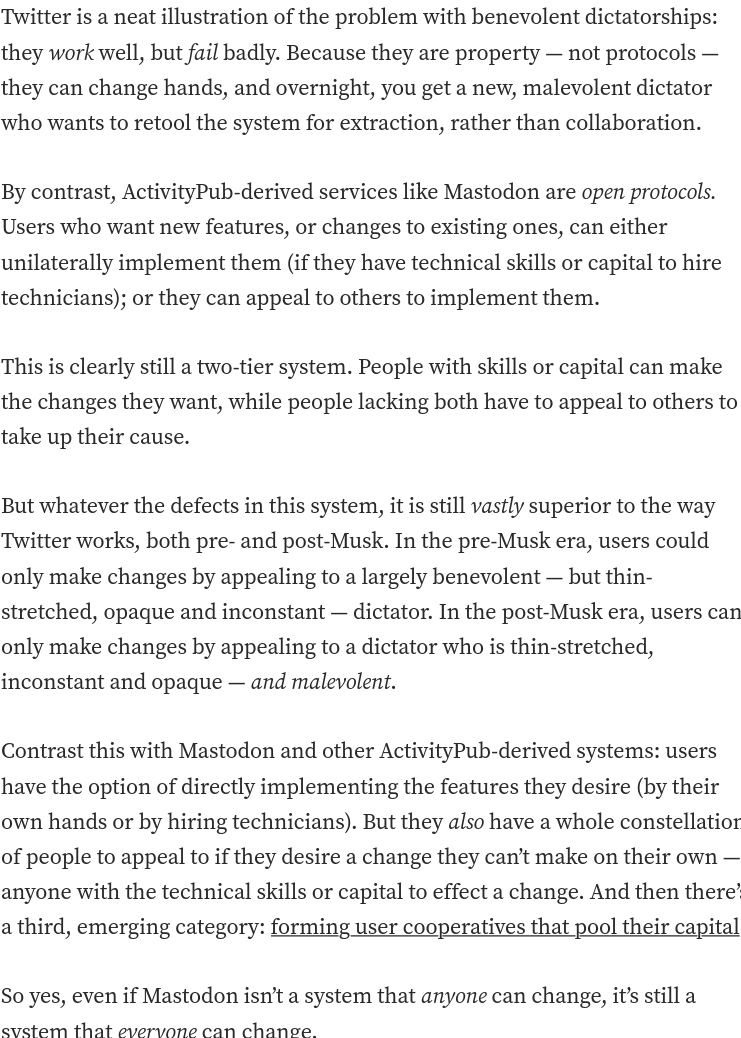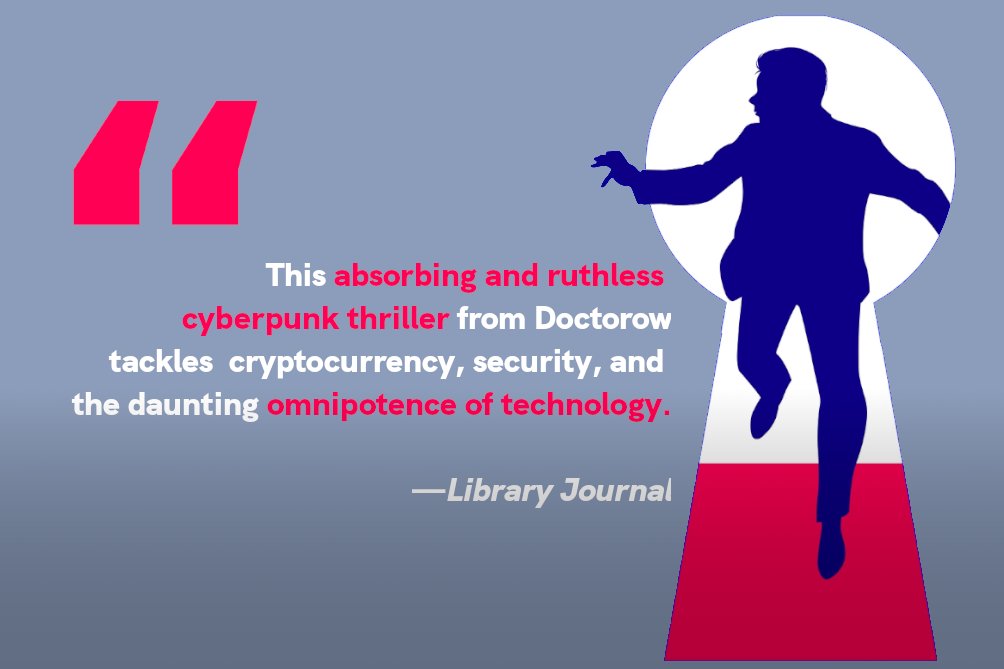For apologists, #SVB's #bailout was mere prudence: innocent bystanders stood in harm's way - rank-and-file startup employees, elite private school scholarship kids -so regulators improvised measures to make everyone whole without costing the public a dime. What's not to like?
1/
1/

If you'd like an essay-formatted version of this thread to read or share, here's a link to it on pluralistic.net, my surveillance-free, ad-free, tracker-free blog:
pluralistic.net/2023/04/15/soc…
2/
pluralistic.net/2023/04/15/soc…
2/
But that account doesn't hold up to even the most cursory scrutiny. Everything about it is untrue. Take the idea that this wasn't a "bailout" because it was the depositors who got rescued, not the shareholders.
3/
3/
That's just factually untrue: guess where the shareholders kept their money? That's right, SVB. The shareholders of SVB will get billions in public money thanks to the bailout. *Billions*:
pluralistic.net/2023/03/18/2-b…
4/
pluralistic.net/2023/03/18/2-b…
4/
But is it *really* public money? After all, the #FDIC payouts come from a pool of funds raised from all of America's banks. The billions the public put into SVB will be recouped through hikes on the premiums paid by every bank.
5/
5/
Well, sure - but who do you think the banks are going to gouge to cover those additional expenses? Hint: it's not going to be the millionaires who get white-glove treatment and below-cost loans.
6/
6/
It'll be the working people whom the banks steal billions from every year in overdraft fees - 78% of these are paid by 9.2% of customers, the very poorest, and they amortize to a 3,500% loan:
pluralistic.net/2021/04/22/iho…
7/
pluralistic.net/2021/04/22/iho…
7/
As #AdamLevitin put it on @CreditSlips:
> They will pass those premiums through to customers because the market for banking services is less competitive than the market for capital.
8/
> They will pass those premiums through to customers because the market for banking services is less competitive than the market for capital.
8/
>In particular, the higher costs for increased insurance premiums are likely to flow to the least price-sensitive and most “sticky” customers: less wealthy individuals.
9/
9/
> So average Joes are going to be facing things like higher account fees or lower APYs, without gaining any benefit. Instead, the benefit of removing the cap would flow entirely to wealthy individuals and businesses.
10/
10/
> This is one massive, regressive cross-subsidy. It's not determinative of whether raising the cap is the right policy move in the end, but this is something that should be considered.
creditslips.org/creditslips/20…
11/
creditslips.org/creditslips/20…
11/
The SVB apologists display the most curious and bizarre imaginative leaps...and imaginative failings. For them, imagining that regulators will just wing it to the tune of hundreds of billions in public money is simplicity itself.
12/
12/
Meanwhile, imagining that those same regulators would say, "Not one penny unless every shareholder agrees to sign away their deposits" is literally impossible.
13/
13/
This bizarrely inconstant imagination carries over into *all* of the claims used to justify the SVB bailout - like, say, the claim that if SVB wasn't bailed out, everyone would pile into #TooBigToFail banks like #Jpmorgan.
14/
14/
This is undoubtably true - unless (and hear me out here!), regulators were to use this failure as a launchpad for *public* banks, and breakups of #Jpmorgan, #WellsFargo, #Citi, et al.
15/
15/
This is a very weird imaginative failure. America operated public banks. It had broken up too big to fail banks. These weren't the deeds of a fallen civilization whose techniques were lost to the mists of time.
16/
16/
There are literally people alive today who were around when America operated nationwide public banks - a practice that only ended in 1966! We're not talking about recovering the lost praxis of the druids who built Stonehenge without power-tools, here.
17/
17/
The most telling imaginative failure of SVB apologists, is this: they think that people are angry that the government saved the janitors at startups and the scholarship kids at private schools, and *can't imagine* that people are angry that America *didn't* save anyone else.
18/
18/
If you're a low-income student at an elite private school, there's billions on hand to save you - but not because the government gives a damn about you - saving you is a side effect of saving all the rich kids you go to school with.
19/
19/
Likewise, the startup janitors aren't the target of the bailout - they're overspill from the billions mobilized to rescue the personal fortunes of tech billionaires who supply VCs' investment capital.
20/
20/
If there was a way to bail out the startups without bailing out the janitors, that's exactly what would happen.
21/
21/
How do I know this? Well, first of all, the "investors" who demanded - and received - a bailout are on record as *hating workers* and wanting to fire as many of them as possible.
22/
22/
As one of the loudest voices for the bailout said of Twitter employees, in a private message to Elon Musk following the takeover: "Day zero: Sharpen your blades boys 🔪":
pluralistic.net/2023/03/21/tec…
23/
pluralistic.net/2023/03/21/tec…
23/
But there's even better evidence that the bailout's intended target was wealthy, powerful people, and every chance to carve out working people was seized upon.
24/
24/
When regulators engineered the sale of #SVB to First Citizens Bank, they did not require First Citizens to honor SVB's community development obligations, killing thousands of affordable housing units that had been previously greenlit:
calreinvest.org/wp-content/upl…
25/
calreinvest.org/wp-content/upl…
25/
Tens of thousands of people wrote to regulators, urging them to transfer SVB's #CommunityBenefitsPlan obligation to First Citizens:
dailykos.com/campaigns/peti…
As did @RepMaxineWaters, the ranking member of the House Financial Services Committee:
democrats-financialservices.house.gov/uploadedfiles/…
26/
dailykos.com/campaigns/peti…
As did @RepMaxineWaters, the ranking member of the House Financial Services Committee:
democrats-financialservices.house.gov/uploadedfiles/…
26/
But First Citizens - a bank whose slot in America's top-20 banks was secured through a string of exceptions, exemptions and waivers - was *not* required to take on SVB's obligations to carry out loans to build thousands of affordable housing units.
27/
27/
These units had been underway in the Bay Area and Boston, including a 112-unit building for people with disabilities planned for a plum spot across from San Francisco City Hall:
levernews.com/regulators-sti…
28/
levernews.com/regulators-sti…
28/
All those people who wanted SVB's community development obligations to carry forward vastly outnumbered the people calling for billionaires portfolio companies to be saved - but they merely spoke on behalf of people who sought the most basic of human rights - shelter.
29/
29/
No one listened to them. Instead, it was the hyperventilating all-caps "investors" who spent SVB's no-good weekend shouting on Twitter about the fall of civilization who got what they wanted, with a bow on top, and a glass of publicly funded warm milk before bed.
30/
30/
The US finance sector is reckless to the point of criminally negligence. It constitutes an existential risk to the nation. And yet, every time it gets into trouble, regulators are able to imagine *anything* and *everything* to shift their risks to the public's shoulders.
31/
31/
Meanwhile, everyday people are frozen out. School lunches? Unaffordable. Student debt cancellation? Inconceivable. Help for the hundreds of thousands of NYC children whose schools are facing a $469m hack-and-slash attack? That's clearly impossible:
council.nyc.gov/joseph-borelli…
32/
council.nyc.gov/joseph-borelli…
32/
When it comes to helping everyday people, American elites and their captured champions in the US government have minds that are so rigid and inflexible that it's a wonder they can even dress themselves.
33/
33/
But when the fortunes and wellbeing of the wealthy and powerful are on the line, their minds are *so* open that some of their brains actually leak out of their ears and nostrils:
pluralistic.net/2023/03/15/mon…
34/
pluralistic.net/2023/03/15/mon…
34/
Every bank merger is supposed to come with a "public interest analysis." But these analyses are "perfunctory." They needn't be:
openyls.law.yale.edu/bitstream/hand…
35/
openyls.law.yale.edu/bitstream/hand…
35/
First Citizens got a hell of a bargain: it paid *zero dollars* for SVB's assets, its deposits and its loans. Any losses it incurs from its commercial loans over the next five years will be paid by the FDIC, no questions asked.
36/
36/
The inability of regulators to convince First Citizens to assume SVB's community obligations along with those billions in public largesse speaks volumes.
37/
37/
Meanwhile, SVB's shareholders continue to claim that their headquarters are a relatively unimportant office in Manhattan, and not their glittering, massive corporate offices in San Jose.
38/
38/
It's a bid to shift bankruptcy proceeding to the #SDNY, where corporate criminals like the Sackler opioid family got such a warm reception that they were able to escape "bankruptcy" with billions in the bank, while victims were left in the cold:
pluralistic.net/2023/03/18/2-b…
37/
pluralistic.net/2023/03/18/2-b…
37/
Contrary to what SVB's apologists think, the case against them isn't driven by spite - it's driven by *fury*. America's "socialism for the rich, rugged individualism for the poor" has been with us for generations, but rarely is it so plain as it is in this case.
38/
38/
Image:
Lydia (modified)
commons.wikimedia.org/wiki/File:Vicr…
Oatsy40 (modified)
flickr.com/photos/oatsy40…
Håkan Dahlström (modified)
flickr.com/photos/9375524…
CC BY 2.0
creativecommons.org/licenses/by/2.…
eof/
Lydia (modified)
commons.wikimedia.org/wiki/File:Vicr…
Oatsy40 (modified)
flickr.com/photos/oatsy40…
Håkan Dahlström (modified)
flickr.com/photos/9375524…
CC BY 2.0
creativecommons.org/licenses/by/2.…
eof/
• • •
Missing some Tweet in this thread? You can try to
force a refresh

 Read on Twitter
Read on Twitter





















